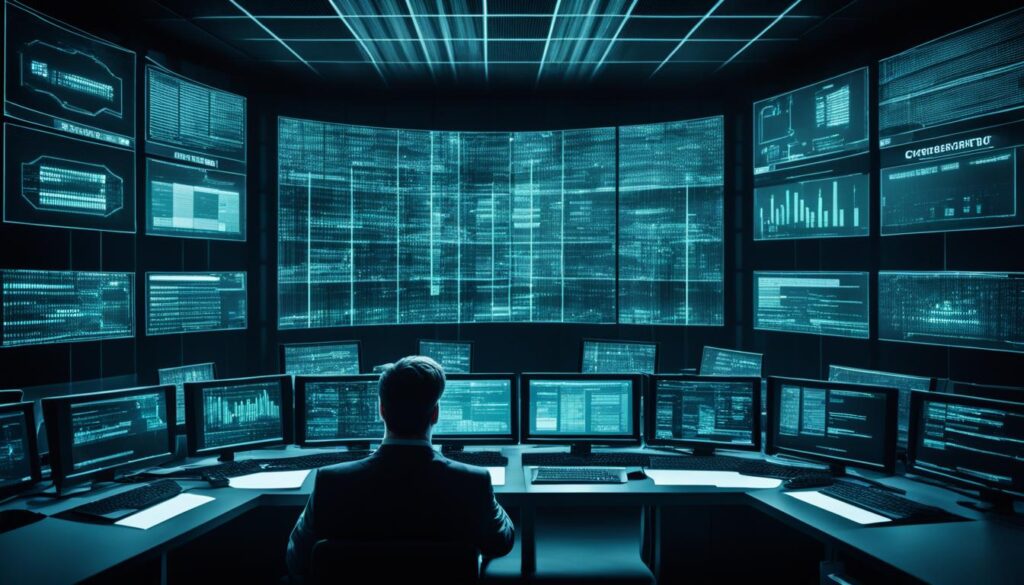What forces can change a media giant’s reputation in an instant? In the entertainment world, where what people think matters a lot, having a good reputation is key. We’re looking into how media and entertainment companies handle their reputations through case studies.
The entertainment industry often faces controversy. Scandalous tweets or data breaches can quickly harm a company’s image. Negative actions can lead to boycotts and a drop in sales. Companies like Netflix and Hulu face cyber threats that could hurt their reputation1.
A huge 90% of customers will leave companies with bad reputations2. This shows how important public opinion is for success. In fact, reputation issues have caused more than half of a company’s value to drop in over 12% of cases in the last 40 years. This has led to a huge $1.2 trillion loss in shareholder value3.
But, there’s hope. Our study will show how some big names in media have turned bad situations into chances for growth. We’ll look at how leaders quickly acted to fix problems and regain trust. This shows that in entertainment, the show always goes on.
Key Takeaways
- Reputation crises can destroy over 50% of company value in extreme cases
- 90% of customers avoid companies with poor reputations
- Cyber threats pose significant risks to streaming services
- Swift action is crucial in mitigating reputation damage
- Negative behavior can lead to boycotts and declining sales
- Reputation management is essential for financial stability in the entertainment industry
Understanding Reputation Risk in the Entertainment Sector
In the entertainment world, managing your reputation is key. It can either boost or ruin careers and companies. The idea of reputation risk has become very important, seen as the “risk of risks” since 20074.
Now, 26% of companies see reputation as a top-three risk, and 55% as a top-five risk. This shows a big jump from 2021, proving how vital brand equity is today5.
The entertainment industry faces big risks to its reputation. A star’s image is as important as their talent. Bad actions can lead to negative reviews, boycotts, and less sales. Companies must handle risks from stars, how they share their work, and public events to keep trust with consumers.
Reputation crises can hit hard. More than 12% of times, they cut a company’s value by over half, costing $1.2 trillion in shareholder value over 40 years6. This shows the need for strong plans to manage reputation in media and entertainment.
“Reputation is like a delicate ecosystem in the entertainment world. One misstep can cause ripples that affect not just the individual, but the entire industry.”
To tackle these issues, 95% of companies set budgets for handling reputational damage5. This shows a growing awareness of how reputation, being socially responsible, and doing well in the long run are linked in entertainment.
As we deal with the complex world of media and how people behave, managing reputation risk will keep being key in the entertainment industry’s future.
Top Reputation Risks Facing Media and Entertainment Companies
The media and entertainment industry faces big challenges in keeping its good name. We’ve found several key risks that companies must tackle to stay respected.

Cyber threats are a big worry for streaming services and digital platforms. Data breaches can cause service outages and make customers lose trust. It’s vital to protect intellectual property, as theft can hurt a company’s profits and reputation7.
Violent acts at events are a big concern. Event organizers need to have strong security to keep people safe. This risk also applies to online platforms, where keeping content safe is key.
Adapting to new business models brings both chances and challenges. Moving to direct-to-consumer content needs careful handling to meet what customers want8.
Talent risk is special in this field. Relying on stars for success can fail if their actions harm the brand. Companies must find a balance between using stars and managing their reputation.
“In the media and entertainment world, your reputation is your currency. Protecting it requires constant vigilance and adaptation.”
To tackle these risks, companies are putting money into proactive reputation management, crisis planning, and talking to stakeholders. By being proactive, media and entertainment firms can stay strong and keep their good name in a fast-changing world78.
Case Study: The Roseanne Barr Incident and ABC’s Response
The Roseanne Barr controversy made big waves in the media world. It showed how fast you need to act when a social media storm hits. “Roseanne” came back to ABC after a long break and was a huge hit. It became the second most popular comedy on TV and made about $45 million from ads910.
Then, on May 30th, Barr tweeted something racist about Valerie Jarrett, a former Obama official. The reaction was strong and quick11. ABC didn’t wait to act. They canceled the show in just 24 hours, even though it was very popular and could have made $60 million more911.

ABC’s entertainment head, Channing Dungey, quickly spoke out against Barr’s tweet. He called it “abhorrent and repugnant.” This strong move showed ABC’s commitment to its values over making money10.
After that, Barr’s career fell apart. Her agent left her, and shows around the world stopped airing her episodes. She tried to fix things with many apologies and interviews, but it was too late11.
This story shows how important it is to act fast and strongly in crisis situations. ABC’s quick action set a high standard for companies in the entertainment world. It showed that sticking to your values is more important than making money in the eyes of the public.
Cyber Threats and Intellectual Property Protection
The media and entertainment industry faces big digital security challenges. Data breaches and content leaks are major worries for streaming services and content producers. From 2008 to 2016, cyber-related events grew a lot, with data breaches being the top issue12.
Big incidents have shown how vulnerable the industry is. In 2017, Netflix and HBO got hacked, leading to leaked TV show plots. A huge cyber attack in 2014 stole unreleased movies, private emails, and financial info. These breaches can really hurt a company’s reputation and earnings.

Cybercriminals use many ways to take advantage of weaknesses. Phishing is the most common attack, while ransomware tries to make money by blocking access to files or systems13. In 2022, ransomware hit many sectors, like cars and schools, causing trouble and demanding money14.
To fight these threats, companies need strong cybersecurity steps. This means using strong, unique passwords, keeping software updated, and using more than one way to prove who you are13. A system that manages threats together can make security better across different products13.
As cyber risks keep changing, the media and entertainment world must stay alert. Putting money into better security and teaching people about cybersecurity is key. This helps protect intellectual property and keeps customers trusting in the digital world.
Media and Entertainment Reputation Impact Analysis: Methodologies and Insights
In the fast-paced world of media and entertainment, managing your reputation is key. We use social listening, sentiment analysis, and data analytics15 to understand public feelings and track reactions. This helps us keep up with what people think about our content and stars.
Handling reputation in our field is tough. For instance, younger folks are dropping SVOD subscriptions more often than older ones. Gen Zs and millennials love watching videos on social media and live streams16.
About 60% of Gen Zs prefer watching videos made by others. This means they don’t need to look for what to watch. Yet, nearly 50% of people waste a lot of time searching for shows on SVOD platforms, ruining their fun16.
To tackle these issues, we use advanced tools for analyzing reputation impact. These tools help us keep an eye on social media, news, and what consumers think. By looking at this data, we can make smart choices about what content to make and how to share it.
It’s interesting that over half of Gen Zs and millennials think social media gives them better TV and movie tips than SVOD. A third of people, and 59% of Gen Zs, often watch shows or movies on SVOD after finding out about them online16. This shows how important it is to listen to what people are saying online.
We’re changing with the times by working more with online creators. We’re even hiring them for TV shows and movies. This approach helps us grow our audience and work better together, keeping our reputation strong in this fast-changing digital world16.
Adapting to New Business Models and Technological Advancements

The media and entertainment world is changing fast. Streaming platforms like Netflix and Spotify have changed how we watch and listen to content. Netflix has over 109 million subscribers, and Spotify has 70 million users17. This big change is making us think differently about media.
Now, content creators can talk directly to their fans. They don’t need traditional middlemen to share their work. This has made the competition fierce, pushing big companies to offer more.
Artificial intelligence is a big part of this change. It helps make content recommendations, improve ads, and make making content faster. The industry uses AI to stay ahead in a fast-changing world.
Companies are changing how they do business to fit with digital tech. This move brings benefits like being more central, reaching new markets, and being more open18. For example, Yellow Pages stopped printing in 2019 and went fully online to keep up with digital growth17.
The entertainment industry is also working on being more eco-friendly. Digital tech helps save resources, supports clean tech, and uses products that can be reused18. This meets what people want: to live more sustainably.
In this digital age, the media and entertainment industry must keep finding new ways to innovate. By using new tech and business models, companies can do well in this changing world.
Conclusion: Building Resilience in the Media and Entertainment Industry
The media and entertainment industry faces big challenges in managing its reputation. With big deals and tough negotiations, the industry is changing fast19. To stay strong, companies need a full plan for handling risks.
Being socially responsible is more important than ever. As people choose direct services over traditional TV, companies must grow their content and improve their online offerings19. They need a strategy that mixes new ideas with doing the right thing.
Best practices in the industry are changing quickly. Leaders are focusing on getting more content, cutting costs, and making smart deals19. By learning from past mistakes and adapting, media companies can handle reputation risks better. The coming media consolidation in 2024 shows the need for quick, smart strategies for lasting success19.
FAQ
What are some of the key reputation risks facing the media and entertainment industry?
How can companies in the media and entertainment industry analyze and manage their reputation impact?
What lessons can be learned from the Roseanne Barr incident and ABC’s response?
How can cyber threats and intellectual property theft impact the media and entertainment industry?
What are some of the challenges and opportunities in adapting to new business models and technological advancements?
Source Links
- 6 Critical Risks Facing the Entertainment Industry – https://riskandinsurance.com/6-critical-risks-facing-the-entertainment-industry/
- What Are the Effects of Reputational Damage – https://www.determ.com/blog/what-are-the-effects-of-reputational-damage/
- Reputation Analytics as a Leading Indicator of ESG Risk – https://www.aon.com/en/insights/articles/the-canary-in-the-coal-mine-reputation-analytics-as-a-leading-indicator-of-esg-risk
- PDF – https://www.corporatecomplianceinsights.com/wp-content/uploads/2017/11/Understanding-Reputation-Risk-.pdf
- Counting the true cost of reputation and ESG risk – https://www.wtwco.com/en-us/insights/2023/10/counting-the-true-cost-of-reputation-and-esg-risk
- Reputation Analytics as a Leading Indicator of ESG Risk – https://www.aon.com/en/insights/articles/the-canary-in-the-coal-mine-reputation-analytics-as-a-leading-indicator-of-esg-risk?collection=29da4b7b-a0c3-4034-998c-53bb528566eb
- Damage to Brand or Reputation | Global Risk Management Survey – https://www.aon.com/en/insights/reports/global-risk-management-survey/top-global-risk-8-damage-to-brand-or-reputation?collection=6f6db0f9-59a5-48fb-ad90-9b82def899b7
- Reputation risk | Deloitte | Risk Angles | Governance, Risk and Compliance services | Article | Perspectives – https://www2.deloitte.com/gr/en/pages/governance-risk-and-compliance/articles/reputation-risk.html
- After Racist Tweet, Roseanne Barr’s Show Is Canceled by ABC (Published 2018) – https://www.nytimes.com/2018/05/29/business/media/roseanne-barr-offensive-tweets.html
- Roseanne Barr rebuked by drug company after blaming Ambien for racist tweet | CBC News – https://www.cbc.ca/news/entertainment/roseanne-barr-blames-ambien-racist-tweet-show-cancelled-1.4683614
- Sorry, not sorry: a timeline of Roseanne Barr’s responses to her firing – https://www.theguardian.com/culture/2018/jul/27/roseanne-barr-apology-timeline
- The nature of losses from cyber-related events: risk categories and business sectors – https://academic.oup.com/cybersecurity/article/9/1/tyac016/7000422
- What is cybersecurity? – https://www.cisco.com/site/us/en/learn/topics/security/what-is-cybersecurity.html
- Cyber Threats 2022: A Year in Retrospect – https://www.pwc.com/gx/en/issues/cybersecurity/cyber-threat-intelligence/cyber-year-in-retrospect.html
- How to Conduct a Media Impact Analysis – https://www.meltwater.com/en/blog/media-impact-analysis
- Social media and creators drive viewers to TV shows, movies, and games – https://www2.deloitte.com/us/en/insights/industry/technology/digital-media-trends-consumption-habits-survey/2024/online-creators-and-the-impact-of-social-media-on-entertainment.html
- Adapt or die: eight businesses that transformed their business models to survive – https://www.hiscox.co.uk/broker/about-hiscox/news/adapt-or-die-eight-businesses-transformed-their-business-models-survive
- Role of Digital Technology in Transforming Organizational Competencies Influencing Green Economy: Moderating Role of Product Knowledge Hiding – https://www.ncbi.nlm.nih.gov/pmc/articles/PMC8754051/
- 2024 media and entertainment industry trends – https://www.ey.com/en_us/insights/media-entertainment/media-and-entertainment-industry-trends-2024

